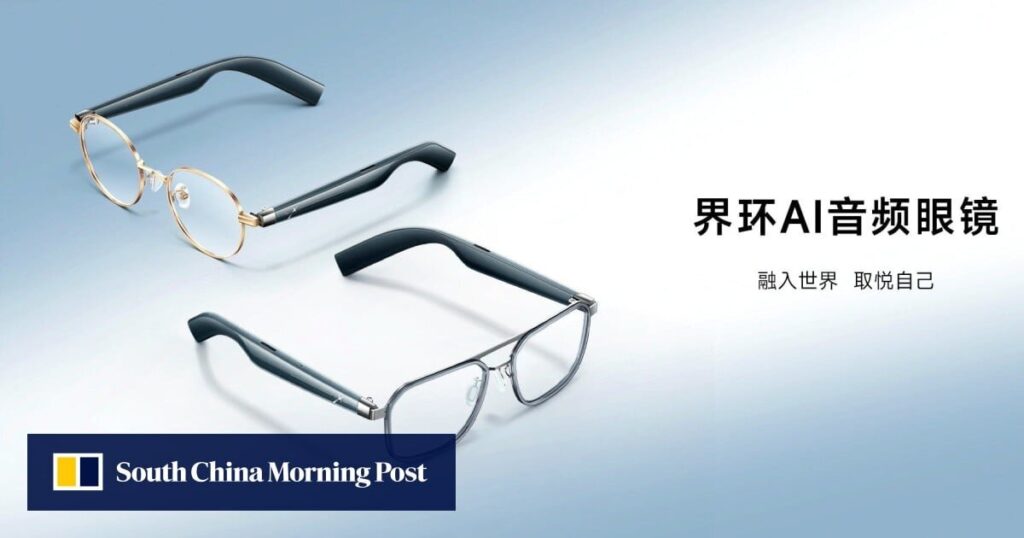In the booming tech sector, competition is fierce, and affordability often becomes a decisive factor for consumers. Positioned against their overseas counterparts, the Jiehuan frames emerge as an emblem of cost-effectiveness, priced at a mere 699 yuan (approximately US$98). Despite the budget-friendly pricing, their functionality matches that of leading products, featuring swift access to advanced large language models (LLMs) via integrated speakers and microphones. These LLMs, the brains behind intelligent chatbots like OpenAI’s ChatGPT, bring powerful AI capabilities to the user’s fingertips—or rather, their voice commands.
Superhexa, a startup backed by the tech titan Xiaomi, is the latest entrant in this competitive arena. Last month, the company launched its innovative AI audio glasses Jiehuan. “It took millions of years for humans to evolve and develop two hands; it’s a waste to have one hand holding a smartphone,” remarked Xia Yongfeng, founder and CEO of Superhexa, in an interview with local news outlet tmtpost.com. His statement underscores a growing desire to free up human hands from the necessity of holding smart devices, steering instead towards more integrated and hands-free technology solutions.
The rapid progression of generative AI technology has fundamentally enhanced smart glasses, making them smarter than ever before. Advances over the past few years have allowed these wearables to interface seamlessly with LLMs for instant information access or real-time conversation translation. This evolution has amplified consumer interest significantly.
Ray-Ban and Meta Platforms have been at the forefront of this trend, witnessing a substantial surge in sales since they incorporated AI features into their US$300 smart glasses equipped with cameras. According to Francesco Milleri, CEO of EssilorLuxottica, the parent company of Ray-Ban, the newly upgraded versions managed to outstrip their predecessors’ two-year sales figures in just a few months.
Market insights from Sinolink Securities project that smart glasses shipments will soar to 2 million units by year’s end. This is a monumental leap from the 480,000 units sold in the augmented reality glasses market last year. Chinese tech firms, recognizing this growth potential, are stepping up to offer similar functionality to Ray-Ban frames but at more accessible prices.
The Jiehuan glasses, for instance, offer an impressive 11 hours of music playback and can remain on standby for up to half a month, all within a lightweight frame of just 30 grams. The feature set includes voice-guided navigation, AI chat, and audio translation, making these glasses quite versatile. One user shared their experience on social media platform Xiaohongshu, noting that while the glasses come in stylish designs with commendable audio quality, they do struggle with voice recognition in noisy settings.
Multiple players from the Chinese tech ecosystem, including startups from Hangzhou and Shenzhen as well as established tech giant Huawei Technologies, have introduced their AI glasses between April and May this year. However, some analysts express skepticism about the long-term market potential. Ivan Lam, senior analyst at Counterpoint, highlighted that current AI glasses are akin to conventional spectacles or sunglasses augmented with electronic components like speakers and cameras. Despite the initial curiosity from early adopters, widespread acceptance might lag if users do not find a compelling need to wear these devices regularly.
Lam suggests that to sustain growth, manufacturers must focus on reducing the weight of the glasses, enhancing the wearing experience, and extending battery life. Companies such as Hong Kong-based Solos are already making strides in these areas. Solos aims to rival Ray-Ban and Meta this fall with its new lightweight AirGo smart glasses, which will feature a camera and weigh just 30 grams, priced comparably to the Ray-Ban models. Their current AirGo 3 frames, without a camera, start at US$250.
In the same vein, Shenzhen-based startup Realities has prioritized style with its new G1 glasses, which began international shipping recently. These glasses are fitted with LED microdisplays but omit speakers, starting at US$600.
Brilliant Labs, a company initially established in Hong Kong but now operating out of Singapore, has introduced their Frame smart glasses for US$350. Co-founder and CEO Bobak Tavangar emphasizes an open-source approach to foster innovation across various applications, from helping autistic individuals interpret emotions to aiding medical professionals with diagnostic accuracy using AI.
Although brands like Superhexa are carving out a niche with their affordable offerings, higher-priced competitors are primarily targeting international markets where access to diverse AI models remains tightly regulated. The unfolding story of AI smart glasses reveals an industry poised on the brink of widespread adoption, propelled by innovation, accessibility, and the relentless pursuit of consumer convenience.


